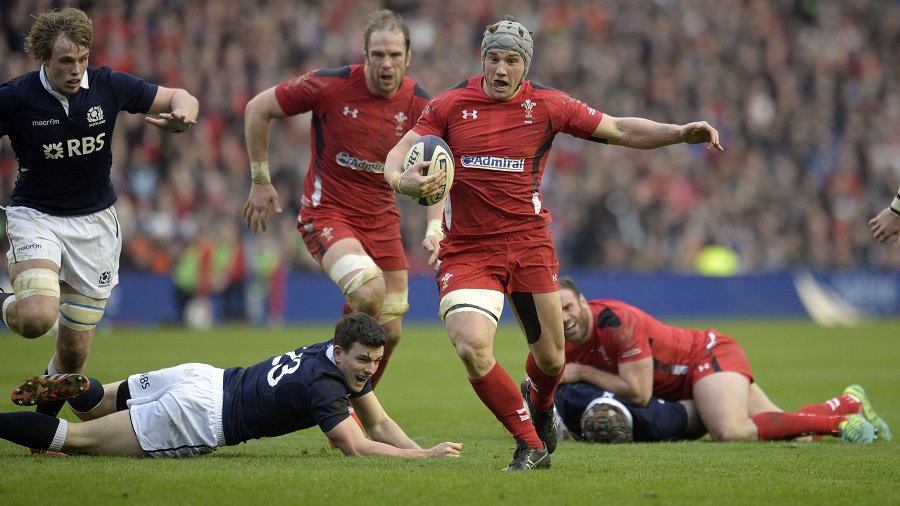|
Scotland 23-26 Wales
Marginal gains guide Wales to glory
Huw Richards at Murrayfield
February 15, 2015

Jonathan Davies' try won the game for Wales © Getty Images
Enlarge
In the end it was hard not to feel sorry for Scotland; so much fire and enterprise in their first two matches and so little to show for it. That least desirable of near-annual events, a potential wooden spoon decider against Italy, looms again. Both teams have played some excellent rugby in losing four matches between them, so it will probably be a shocker. False Scottish dawns, born as much of hope as of expectation, have been a regular feature of the years since they became the last Five Nations champions in 1999. Yet there is reason to feel that there is more substance to this nascent upturn than to its predecessors. It is also years since Scotland offered an authentic attacking threat from open play. You pretty much have to go back to the days when Gregor Townsend's mercurial talents were illuminating its midfield. And while players turned coaches do not invariably turn out teams in their own image - think Clive Rowlands's brilliant Welsh attackers of the 1970s - it is perhaps no fluke that Townsend's fingerprints are all over this Scottish team. Five of the backs play for Glasgow, and their best moments going forward reflect the quick-thinking, fluid, fast cycling and offloading style that has made them one of the most exciting teams in Europe this year. There is at last a cutting edge in midfield, where the triangle of Finn Russell, Mark Bennett and Alex Dunbar looks Scotland's best in years. Where for so long they were compelled to accommodate mere competence, the competition provided for the incumbent centres by Matt Scott means that excellence may now have to be excluded. There is pace and invention in the back three, and all the strings are pulled artfully from scrum-half by Greig Laidlaw. Given that he adds the ability to play outside-half and kick goals to the quick hands and thought he offers from the base of the scrum, his exclusion was one of the minor mysteries of the last Lions party. Nothing that he has done since has made any more sense of it. And yet, just as Glasgow did not quite make it to the last eight of the Champions Cup, so Scotland fell short here. It was a pity that Scott was not awarded the try which he looked to have scored three minutes from time - the knock-on ruling against the lively Sam Hidalgo-Clyne seeming harsh. It could have made for a rousing finale, yet it is hard not to believe that Wales would have held on.
This was an afternoon on which Wales won vital marginal battles. They generally had a physical edge at close quarters, enabling them to slow the game down after the Scots had made initial incisions. That reflected two other aspects of their game, a sharp-witted street wisdom and watertight defence. Shaun Edwards will doubtless find plenty to complain about - that, after all, is what defence coaches do. But Wales held up through two vital sieges of their line - the assault which ended with Laidlaw inches from their line at the end of the first-half and a 15-phase examination in the later stages of the second half. Wales did not quite match the supreme discipline shown by Ireland in the closing stages of their victory over France. Penalties were conceded, which the Scots often chose to run rather than kick. But another difference was that Scotland showed much more invention and variety than the bludgeoning French. Wales also capitalised decisively on the six minutes when it had 15 men to Scotland's 14 following the sin-binning of Finn Russell, scoring 10 points to turn a four point deficit into a six point half-time lead. Scotland managed only three points in the similar period when it had a one-man advantage, after Russell had returned but Jonathan Davies was still completing his spell in the bin. This, again, was no fluke. Wales's best period, the rip-roaring start aside, of the miserable evening against England was the 10 minutes when Alex Cuthbert was binned. There was also more variety in attack than we have seen recently. After a fallow period Leigh Halfpenny, who remained exemplary in other ways, appears to have regained his attacking dimension. Liam Williams offers a different kind of attacking threat to George North, but loses nothing in the comparison. And the combative half-back pairing of Dan Bigger and Rhys Webb continues to grow in stature. Among the forwards Alun Wyn Jones had one of the days when the Guardian anointing him as Wales's finest lock makes sense. This was, to borrow Andy Farrell's comment after last week's match in Cardiff, a proper Test match - and a test which Wales passed. Like so much in current rugby, this match proved the eminent good sense of Joe Schmidt, who refused to describe next round's showdown with England as a potential Grand Slam decider because Ireland still had real challenges against Wales and Scotland to come after that. Ireland currently has the edge on both, but Schmidt is right - to take either lightly would be fatal. © ESPN Sports Media Ltd
| ||||||||||||||||||||||||||
Live Sports
Communication error please reload the page.
-
Football
-
Cricket
-
Rugby
-
- Days
- Hrs
- Mins
- Secs
F1 - Abu Dhabi GP
Abu Dhabi Grand Prix December 11-131. Max Verstappen ()
2. Valtteri Bottas (Mercedes)
3. Lewis Hamilton (Mercedes)
4. Alexander Albon ()
5. Lando Norris ()
6. Carlos Sainz Jr ()
-
ESPNOtherLive >>
Golf - Houston Open
Snooker - China Open
Tennis - Miami Open

